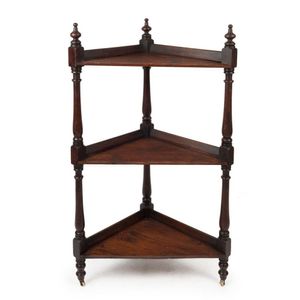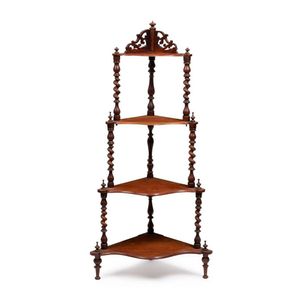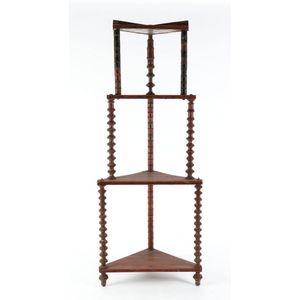
1850 Colonial Australian Cedar and Pine Corner Wotnot, Three Tiers
An antique Colonial Australian cedar and pine corner wotnot with three tiers, circa 1850, 126 cm high, 74 cm wide, 40 cm deep

Colonial Australian Cedar Corner Wotnot, 1885
A Colonial Australian cedar four tier corner wotnot, circa 1885, 125 cm high, 55 cm wide, 35 cm deep

Depression-era Australian Folk Art Corner Wotnot
Australian Folk Art depression era cotton reel corner wotnot with white painted finish, circa 1890s, '142 cm high, 41 cm wide, 25 cm deep

Depression-Era Australian Cotton Reel Corner Wotnot
Australian Folk Art depression era cotton reel corner wotnot, circa 1890s, 124 cm high, 48 cm wide, 27 cm deep

Antique Australian Twig and Branch Corner Display
Australian Folk Art twig and branch construction corner wotnot with original brown painted finish, circa 1900, 127 cm high, 50 cm wide, 39 cm deep

Victorian Cedar Four-Tier Corner Stand
Corner What not Victorian cedar, four tier, with turned columns, height 141 cm, depth 45 cm

Barossa Valley Folk Art Bobbin Reel Corner Wotnot
A folk art bobbin reel corner wotnot, Barossa Valley, South Australia, 19th century, 123 cm high, 59 cm wide, 35 cm deep

Victorian Cedar Corner Whatnot
A Victorian cedar corner whatnot, second half 19th century, the five tier whatnot with shaped shelves of typical graduating waterfall form with a pierced shaped gallery, and bobbin style supports with finials. Height 138 cm. Width 61 cm. Depth 39 cm.

Victorian Walnut Corner Whatnot
A Victorian walnut corner whatnot. Later 19th century, of four tier graduating form with turned and spiral carved supports, finials and fretwork, each shelf inlaid with ebony and satinwood in the Sheraton manner, raised on ball and squashed bun feet.…

Colonial Cedar Serpentine Corner Whatnot with Turned Supports
A rare colonial cedar six stage serpentine corner whatnot, of unusually large proportions, plain with turned column supports and finials, with a single wide boarded back and supported on four original white china casters. New Zealand or Australian made.…
 Loading more...
Loading more...